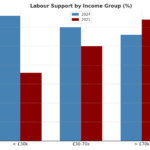Britain’s Trump Moment? Farage, Reform, and the ECHR Exit
By Jaffa Levy —
Reform UK has stopped talking about “turning the boats back.” According to Mark White’s interview for GB News, Nigel Farage now speaks the language of deportations, legal resets, and international withdrawals. It is not a tactical slogan anymore; it is an entire architecture for pulling Britain out of the European Court of Human Rights and building a new domestic migration regime.
The plan, as set out on GB News, is blunt:
- Repeal the Human Rights Act.
- Withdraw from the European Court of Human Rights.
- Re-examine or abandon the UN Refugee Convention.
The purpose is deterrence. Under Reform’s blueprint, no one arriving across the Channel would be permitted to claim asylum in Britain. Instead, they would be detained in secure camps — often on disused military bases — and then deported, either to their home country or to a third country such as Rwanda.
Farage acknowledges, as GB News reports, that physically forcing boats back to France is impractical and diplomatically explosive. The alternative is to deny settlement completely. “Break the model,” as he puts it: if migrants know they will be removed, smugglers lose their market.
This is also a political turn. Farage once opposed using RAF Scampton as a migrant site; now Reform promises the difference will be strict detention and no free movement into local towns. The party avoids naming new sites, wary of triggering “not in my backyard” resistance. And it is riding high enough in the polls to start speaking as if it were preparing for government, not protest.
The Trump Connection
Farage’s friendship with Donald Trump is no secret. He spoke at a Trump rally in Mississippi in 2016, attended the Republican National Convention in 2024, and has interviewed Trump multiple times on GB News. He calls him “my friend.” In America, Trump has campaigned on — and begun to implement — the largest mass-deportation programme in modern U.S. history, with expanded detention facilities and federal resources redirected to removal.
It is not speculative to note the parallel. Both leaders cast immigration as a matter of sovereignty; both propose detention-first systems backed by international treaty revision. Farage’s visibility alongside Trump makes it plausible — though not provable — that Reform’s blueprint borrows elements from the Trump playbook.
The dichotomy is clear: where the U.S. debates the scale of ICE raids and mass removals, Britain now faces a party promising to dismantle its rights architecture and build detention camps on home soil.
Law, Logistics, and Risk
The ambition is sweeping, but the barriers are formidable. Withdrawing from the ECHR would ripple into Britain’s constitutional fabric, affecting everything from the Good Friday Agreement to policing. Detention camps require billions in investment, staffing, oversight, and bilateral agreements with states willing to take deportees. Courts, even shorn of Strasbourg oversight, will still test detention powers against principles of fairness and proportionality.
The deterrence model is also brittle. It depends on speed and certainty. If removals stall through legal challenge, backlogs, or lack of cooperation from destination countries, the message collapses. The smugglers will tell their clients: you may still get through.
Britain at the Crossroads
The attraction of this policy is obvious: it is simple, dramatic, and electorally potent. Farage told the BBC, when challenged about refugees, “Whose side are you on?” The soundbite signals a wider posture: that domestic order comes before humanitarian outreach, and that Britain is ready to chart its own course apart from European law.
But this is also Britain’s Trump moment — the import of a politics that defines itself by defiance of institutions, by mass detention as deterrence, and by the claim that only radical rupture can restore sovereignty.
The question is whether Britain, like the United States, is prepared to live with the consequences.


